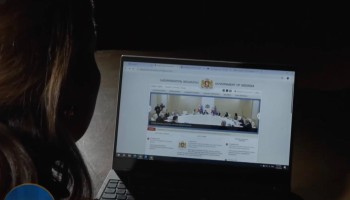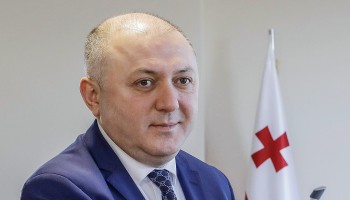Georgia’s Anti-Corruption Bureau has launched a probe into independent media outlets, sending letters to a number of organizations Monday and demanding detailed information about their finances and grants.
Among those targeted are OCCRP member centers iFact and the Governance Monitoring Center (GMC). The Bureau is asking for records on grants, donors, financial operations, agreements and amendments dating back to April. The outlets have three days to comply or appeal in court.
The requests follow legislative changes adopted April 16, when parliament amended the “Law on Grants.” The new rules restrict media and civil society groups from receiving a “foreign grant” without government approval or authorization by a designated body. Donors must now submit draft agreements for approval before funds can be disbursed.
Civil society leaders say the Bureau’s actions are already facing legal challenges. According to Saba Brachveli, a lawyer with the Civil Society Foundation in Tbilisi, several groups have contested the demands, arguing they are “unfounded and do not comply with the law.” But, he added, “the court refuses in every case.”
“Once the appeal process is exhausted, the organizations will be required to provide the information. I know at least some groups will not submit the full details, citing appropriate justification,” Brachveli told OCCRP.
“Ultimately an investigation may be initiated against them,” he added.
Nona Kurdovanidze, chairperson of the Georgian Young Lawyers Association (GYLA), said more than 60 organizations have already received letters, including some that “had not carried out any projects in the past year and had not received funding.”
“As for GYLA’s response, we are taking legal steps, including appealing the unconstitutional provisions of the Law on Grants before the Constitutional Court,” she said. “We are also challenging the court’s order that granted the Bureau access to such extensive information based on its petition.”
She added that GYLA remains committed to pursuing all legal remedies to prevent “repressive laws from being used against organizations” in this way.
Media groups say they are also feeling the pressure. Gogi Zoidze, project manager of GMC, said dozens of organizations are now “in the same boat.”
“The risks are high because the government sees us as enemies,” he told OCCRP. “They are using every possible means to disrupt our activities. But we are doing everything we can to mitigate these risks. We also expect the government will try to introduce even more restrictive measures or legislation to force us out of the country or shut down our work.”
According to Nino Bakradze, co-founder of iFact, a Tbilisi-based investigative outlet, her organization currently has no grant-funded projects and will respond to the Bureau by stating that “no grants were in place.”
“It is difficult to predict what the Georgian Dream will do. What I do know is what we will do. I believe in the struggle of Georgia’s independent media, and I am confident that nothing can overcome us,” she told OCCRP.
Bakradze said iFact will continue investigating corruption and abuses of power, despite the pressure. She described the Bureau’s letters as an attempt to intimidate and confuse, but stressed the outlet has always operated transparently and has “nothing to conceal.”
She warned that Georgia is at a “critical stage of development” and said independent media must keep working “at any cost” to prevent authoritarianism from taking hold.





